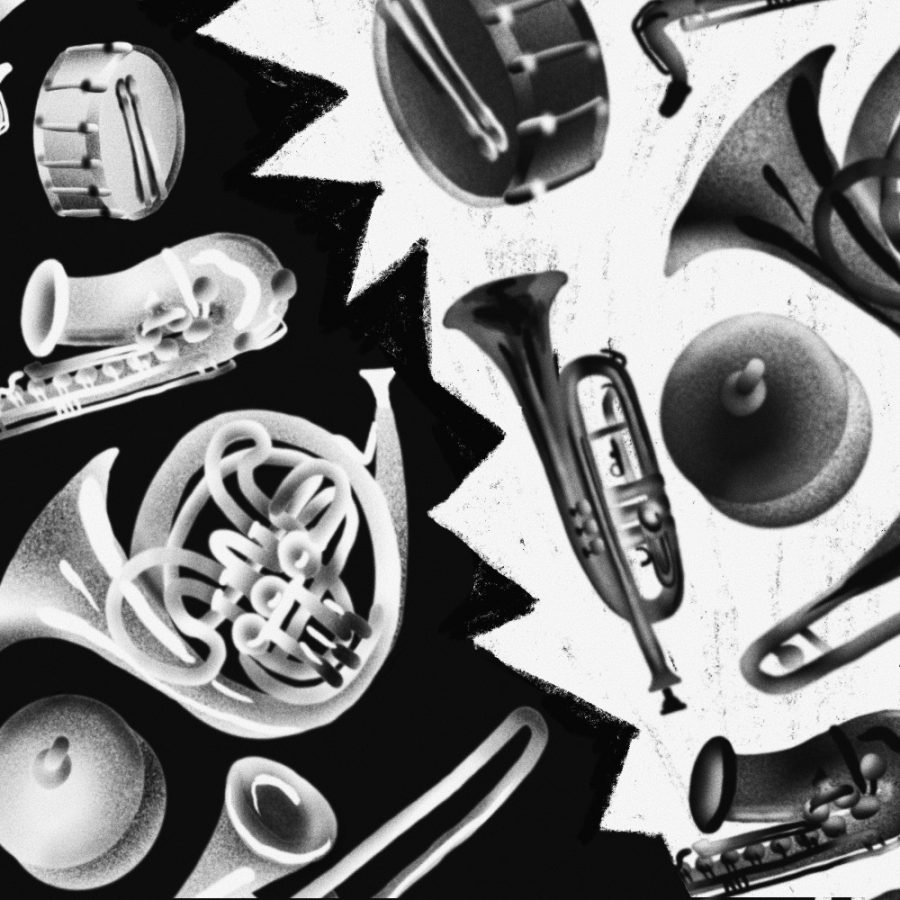Allow Longhorn Band to break tradition
June 21, 2021
Editor’s Note: This article first appeared as part of the June 15 flipbook.
In his March email entitled “Reflections on the Eyes of Texas History Committee’s Report,” UT President Jay Hartzell declared “no one is or will be required to sing ‘The Eyes of Texas.’”
But what about those who are required to play it?
For the last year, debate surrounding the use of “The Eyes of Texas” as UT’s school song has been unrelenting. Black student athletes, band members and those in the general student body have called for its removal amid uncompromising pushback from donors and a lack of support from administration. Last fall, many Longhorn Band members refused to play the school song, citing its racist history as inexcusable and disunifying. In response, the University took a counterproductive approach to reckoning with its racist past: requiring the Longhorn Band to play “The Eyes of Texas” and creating a separate, unnamed band not required to play the song. This new band is set to be officially formed in fall 2022.
By separating the Longhorn Band over an issue as indisputably bigoted as “The Eyes of Texas,” the University proves once again that it adheres to donors and tradition over the will of its student body — especially that of its Black students. All students deserve to feel comfortable joining the official, longstanding Longhorn Band: an undivided band that shouldn’t play the racist song at all.
University spokesperson J.B. Bird said in an email that this new plan is all about offering options to reflect student input, not about requiring students to participate in one option or another. But creating two bands allows the University to avoid confronting issues with “The Eyes of Texas” and gives students the illusion of choice while appeasing its donors. Students have already made their choice, over and over again, and UT has refused to listen. Creating a separate band doesn’t help students; it forces band members to make compromises between their passion and their morals. The separation condones our racist history by mainstreaming it into the official, established band and othering those most affected.
Judson Hayden, LHBlacks president, founding member and communication and leadership senior, said that it was a rash decision that has misdirected conversation.
“(This decision) has provided me with a clarity as to how the University thinks LHB operates. LHB isn’t the problem; wanting to be in LHB isn’t the problem,” Hayden said. “There has been a lot of this rhetoric over this past year: ‘Oh, if you hate it so much, then just leave,’ … and it’s like, no, we don’t hate being in the band. We don’t hate this University. In fact, we love this University so much that we want to make it better for incoming Black students.”
“The Eyes of Texas” joins a repertoire of “traditional university selections” that the Longhorn Band will be required to play. The idea of tradition has become a cornerstone of the pro-school song argument and has been used as an excuse to justify the song’s continuity. Tradition isn’t necessarily evil, but it becomes harmful when weaponized against already marginalized communities. Emails from donors threatening to pull funding and the University’s lacking response shows whose interests have been prioritized. In this case, tradition favors a primarily wealthy, white population whose attachment to the song outweighs their empathy.
Stop using tradition as a means to disregard the voices of the Black student community. It’s not a valid justification for forcing the official band to play a historically racist song, putting both band members and listeners in an uncomfortable position.
Student activists in the Longhorn Band and the greater student community have worked tirelessly over the last year to expose the racist history and sentiment behind “The Eyes of Texas.” It shouldn’t be their burden any longer, and it shouldn’t have fallen this way in the first place. Though Bird said the separation plan was developed with student input, there has been little transparency on what this process looked like and whether Black students were prioritized. Instead of claiming that “changes expand options,” divert the energy and time needed to plan this to investing in actual inclusion efforts, such as making the band more accessible and welcoming to underrepresented students.
No university band should play a divisive and racist song. The constant debate behind what should be a clear-cut issue detracts from the true opportunities the Longhorn Band presents to students.
“Longhorn Band is so much more than ‘The Eyes of Texas,’ and for us to be reduced to that one song is so demeaning,” Hayden said. “It’s a small aspect of what we do as an organization. And if we can use all of the tension, anger and frustration over the past year to do something good, we would be remiss if we didn’t.”
The editorial board is composed of associate editors Maria Sailale, Megan Tran, and editor-in-chief Sanika Nayak.
Editor’s note: The headline has been changed from “It’s time for Longhorn Band to break tradition” to “Allow Longhorn Band to break tradition” to more accurately represent the story.












